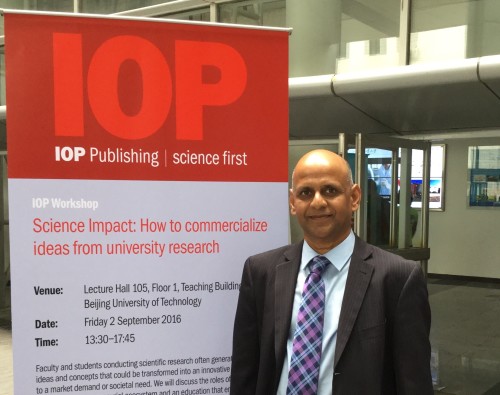
Ethical entrepreneur: Surya Raghu in Beijing.
By Hamish Johnston in Beijing
“90% of new products are targeted at the richest 10% of the world’s population” – that’s my take-home message from a fascinating presentation by Surya Raghu at the Fall Meeting of the Chinese Physical Society here in Beijing. An engineer by training, Raghu founded US-based Advanced Fluidics in 2001 after a career in academia.
Raghu was speaking to a group of Chinese students about how to embark on a career as an entrepreneur. Student-age is the best time to acquire the mindset of an entrepreneur, says Raghu and he emphasized the concept of “inclusive knowledge transfer”. This a way of ensuring that products developed at universities benefit even the most disadvantaged in the world.
But please don’t think that this is all about charity – Raghu also pointed out that this 90% is a huge market where lots of money can be made. He also points out that products and services developed for this market can sometimes be better than those aimed at richer folks. Once example he gave is healthcare, where some medical tests designed for use in developing countries are much more price efficient than those aimed at richer markets.
And Raghu doesn’t just talk about inclusive knowledge transfer. He is co-founder of ET Cube International, which focuses on advising people in developing countries on how to commercialize intellectual property and improve their entrepreneurial skills.
If you think you have a great idea that would benefit the 90% (or the 10% for that matter) Raghu has created a series of lectures on entrepreneurship that are sponsored by the Institute of Physics.
If you are wondering what sort of products Raghu has developed, his first success was a special nozzle for windscreen wiper fluid. It cleverly turns what’s normally a problem – flow instability – into a way of spraying fluid evenly across a windscreen. So the next time you clean your windscreen, you may be using his invention.
• For more on physics in China, check out our brand new Physics World Special Report: China.
As knowledge per se is becoming more and more a “strategic commodity”, its unhindered transfer has to face serious problems in spite of good will from different sides.